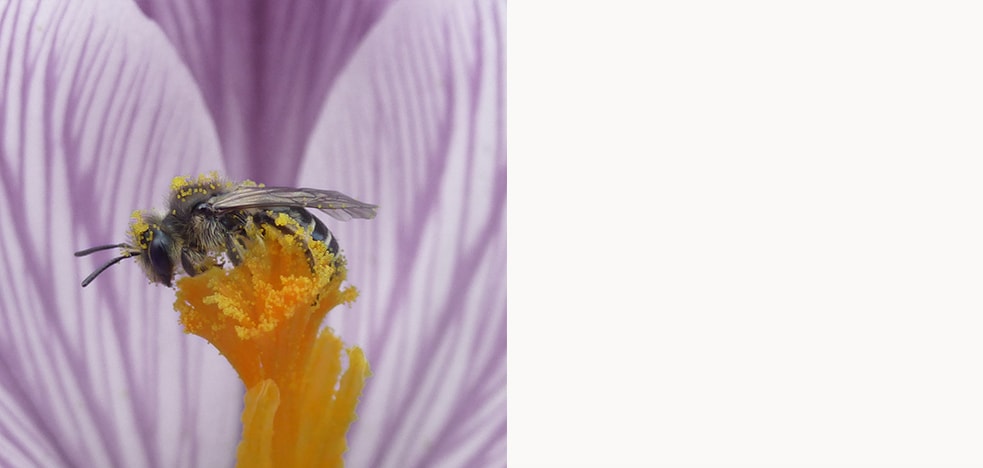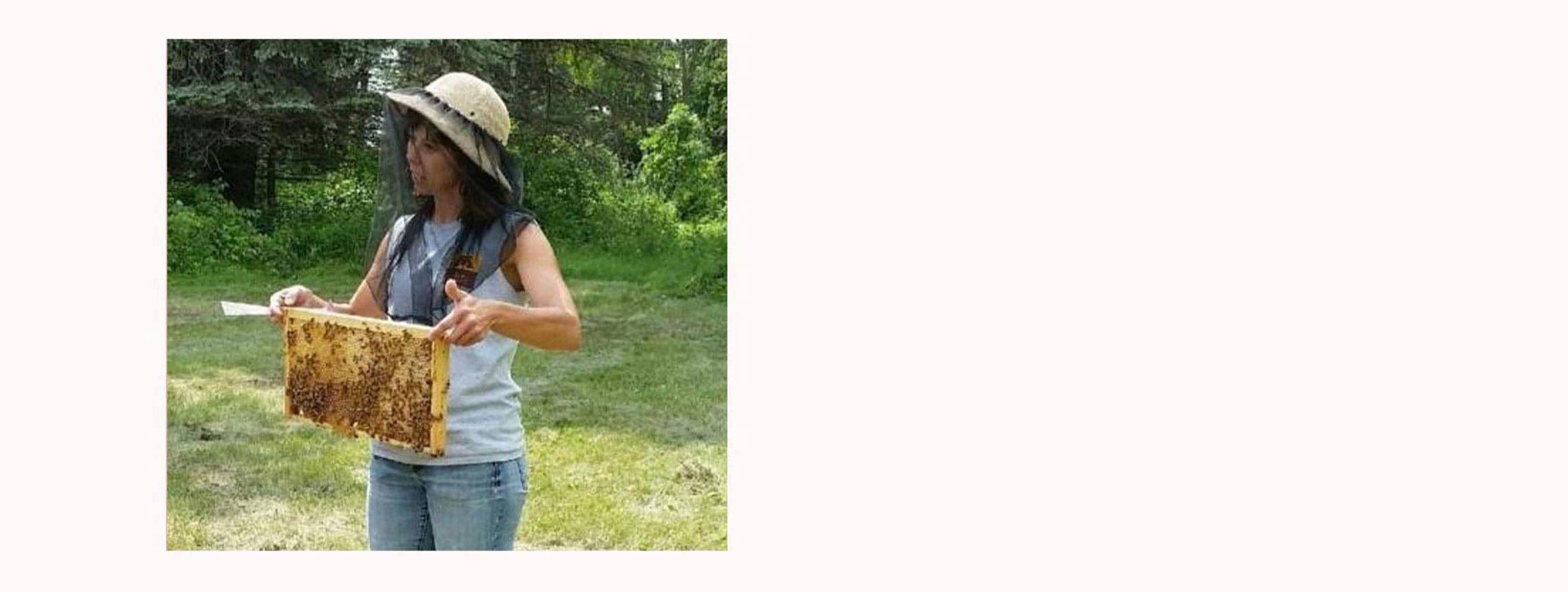Photo credit: Samara Howell
| You are currently signed in as: csr signout | Session open for : Reset customer | Customer Cart | QuikSearch |

Photo credit: Samara Howell
Did you know that many of the fruits and vegetables we love depend on these tiny pollinators? August 15th is National Honey Bee Day, and since it’s our mission to care for the Earth, we strive to help protect those on it, including the smallest of creatures.
Honey bees are a crucial part of the environment, yet they’re facing significant health challenges. To learn why, we turned to bee-expert Becky Masterman, Ph.D. in Entomology, and Aveda’s University of Minnesota (UMN) Bee Squad Program Adviser. Becky shares how Aveda helps protect the bees through this program, and how you can help, too.
Honey bees shoulder enormous responsibility on their tiny wings: one out of every three bites of food on our tables depends on these kinds of pollinators.* In other words, honey bees are integral to our food system.
Becky tells us honey bees are one of the over 4,000 species of bees that live in North America, and their pollination provides our country with a range of foods from almonds and apples to carrots, watermelon and more. All flowers depend on pollination by honey bees in order to survive.
Unfortunately, the population of our pollinator heroes has been sharply declining over the past several years. Fewer bees in our ecosystem may result in higher prices of the foods we love and a shortage of nutritious fruits, vegetables and nuts. The beauty of our landscapes may also decline with fewer flowers to enjoy.
For more than a decade, honey bees have been experiencing a health crisis due to factors such as parasites, pathogens, pesticides, diminishing habitat and poor nutrition.

“Bees have been challenged by deadly viruses that are transmitted by parasitic mites called varroa,” Becky tells us. “These mites were first detected in the U.S. in 1987, and over time they have become serious carriers of viruses that were previously hard to spread.”
The honey bees are facing difficulties when fighting varroa and associated viruses because of pesticides and a lack of adequate nutrition. While varroa and related viruses are a challenge to honey bees alone, Becky says all types of bees are facing nutritional deficits and challenges caused by contact with pesticide-contaminated flowers.
While it may seem like the world is just noticing the plight of honey bees, Becky says they have been dying at high percentages for about thirteen years. Thankfully, their health challenges have been brought to light on a larger stage along with more research, which has helped increase awareness. It’s so important to share this cause in order to support the great diversity of bee species and pollination that the bees provide, Becky tells us.
Our ethos is to care for the Earth, which includes supporting and preserving honey bees for all that they provide. Aveda is built upon the power of flower and plant essences, and without bees and their pollination, we couldn’t make all of the beautiful products you love. To help protect the honey bees, Aveda HQ in Minnesota has been home to multiple honey bee colonies since 2013, managed by our friends at the University Of Minnesota Bee Squad, and overseen by Becky.
In fact, our headquarters is situated on a 58-acre National Wildlife Federation-Certified habitat, which allows us ample space to support the over 100,000 bees in our colonies. We thoughtfully created an environment they can thrive in by using native plants to provide food and shelter, along with trees and shrubs that were carefully chosen to provide nectar for these pollinators. Ample flowers also allow all of the bees to collect nutritious nectar and pollen. Throughout our entire habitat, we avoid the use of harmful pesticides, such as insecticides.
We’re also committed to doing our part to help lessen the burden on honey bees through our transition to all vegan formulas. As of July 2019, all products manufactured are 100% vegan, and we are committed to having all vegan products on shelves by January 1, 2021.
As our trusty program adviser, Becky is part of an important initiative at the University of Minnesota to help preserve precious bees throughout the state. She explains that when you become part of the UMN Bee Squad Bee Network, you join a constellation of individuals, families, nonprofits and corporations that have chosen to actively support bees with the common goal of bringing back a bee-friendly world.

“With honey bee colonies in your yard, on your rooftop, or campus, you will find yourself engaged in conversations about pollinators with family members, co-workers, and neighbours,” Becky says. “It is these vital exchanges that lead to learning, to minds changing, and to communities rethinking how they care for the environment.”
The Bee Squad Bee Network allows the Bee Squad to collect data on honey bee colonies throughout the Twin Cities and metropolitan area, identifying trends in particular geographic areas and gaining insights into honey bee health. Once you join the program, the bees in your colonies will contribute to the science of good beekeeping; Bee Squad uses the data from your bees to communicate best management practices to beekeepers in the region and to contribute to the national conversation amongst beekeepers and scientists on how to make our bees thrive.
There are easy things we all can do every day to help support the bees. Here are some of Becky’s favourite tips to preserve our pollinators:
1. Plant flowers that bloom from early spring to late fall. Flowers can be in pots, plots or pastures. Don’t forget trees and shrubs as these will provide nectar (carbohydrates) and pollen (protein).
2. Provide nesting habitats with bare ground and stems.
3. Support sustainable, research-based management for honey bees.
4. Eliminate pesticide use unless required for health or human safety.
5. Help count and identify bumblebees with the Bumble Bee Watch.
6. Fight the fear of bugs. Identify and learn about what might trigger fear when you see bees flying or crawling near you. Download the inaturalist app to arm yourself with knowledge.
7. Know your bee number! Do some research to learn just how many bee species call your state home.
Understanding the diversity of bees will help you make decisions about how you maintain your landscapes (whether at home, work or school). The first step is planting flowers, the second is helping to maintain habitat for bees.